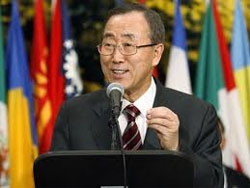Ban Ki-moon urges clean energy revolution
 "Our challenge is transformation. We need a global clean energy revolution a revolution that makes energy available and affordable for all," he told participants in the fourth edition of the World Future Energy Summit.
"Our challenge is transformation. We need a global clean energy revolution a revolution that makes energy available and affordable for all," he told participants in the fourth edition of the World Future Energy Summit.
"This is essential for minimising climate risks, for reducing poverty and improving global health, for empowering women and meeting the Millennium Development Goals, for global economic growth, peace and security, and the health of the planet," he said in his keynote speech.
"You can lead this revolution, and in many ways, many of you are already doing so," he told participants in the summit and exhibition, which has attracted more than 3,000 delegates.
Ban also hailed last month's governmental meeting on climate change in Cancun as one that made progress on financing the fight to tackle global warming and on deforestation, "which accounts for nearly one-fifth of global carbon emissions."
"Taken together, these outcomes give us important tools. Yet of course, we have much farther to travel," he said.
He stressed, however, the need to strengthen efforts on national fronts, noting Abu Dhabi's initiative to create a city powered solely by renewable energy as "just one of a growing number of initiatives in developed and developing countries that are bringing life to our vision of green, sustainable societies."
He pointed out that China, which is considered a major polluter, "is now the world's second-biggest user of wind power and the biggest manufacturer of solar photovoltaics."
"In China, a third of the stimulus package adopted in response to the global economic crisis was broadly environmental," he said.
He also hailed environmental efforts in various other countries, including Costa Rica, Nepal and Rwanda, as well as his own country, South Korea.
"National action need not wait for the negotiations to advance. In fact, such steps can actually help negotiators to produce the agreements we need," he said.
Sultan al-Jaber, the chief executive officer of Masdar, a body created by oil-rich Abu Dhabi to champion the cause of promoting clean energy, stressed the need to use a mix of energy resources.
"Energy must come from a mix of sources... Solar energy is clean, efficient and cost-effective. A mix should also include peaceful nuclear energy, and, of course, renewable energy," he said.
He also called for greater competition in the production of renewable energy, which would result in technological gains.
"Competition drives innovation," he said.
Abu Dhabi sits on proven oil reserves amounting to 98.2 billion barrels 95 per cent of the United Arab Emirates' reserves, which are the world's seventh largest.
The emirate in 2009 won the right to be home to the International Renewable Energy Agency (IRENA), despite criticism of its high carbon footprint.
Abu Dhabi's planned renewable-energy-powered Masdar City, whose name means "source" in Arabic, is expected to cover six square kilometres (2.3 square miles) and is eventually to house 40,000 residents.
It is to be located about 17 kilometres (around 10.5 miles) from downtown Abu Dhabi. But for now, Masdar Institute's buildings are the only ones to have been completed, while ground has been broken on a few others.
In October, Masdar City got its first residents, some 175 students at the Masdar Institute.
But the development is running behind schedule and is expected to be completed between 2020 and 2025, having been slated initially to be finished by 2016.
The cost to build it is said to have dropped from $22 billion (16.6 billion euros) to between 18.7 and $19.8 billion.
What the stars mean:
★ Poor ★ ★ Promising ★★★ Good ★★★★ Very good ★★★★★ Exceptional
 Tag:
Tag:
Related Contents
Latest News
More News
- Russian President congratulates Vietnamese Party leader during phone talks (January 25, 2026 | 09:58)
- Worldwide congratulations underscore confidence in Vietnam’s 14th Party Congress (January 23, 2026 | 09:02)
- Political parties, organisations, int’l friends send congratulations to 14th National Party Congress (January 22, 2026 | 09:33)
- 14th National Party Congress: Japanese media highlight Vietnam’s growth targets (January 21, 2026 | 09:46)
- 14th National Party Congress: Driving force for Vietnam to continue renewal, innovation, breakthroughs (January 21, 2026 | 09:42)
- Vietnam remains spiritual support for progressive forces: Colombian party leader (January 21, 2026 | 08:00)
- Int'l media provides large coverage of 14th National Party Congress's first working day (January 20, 2026 | 09:09)
- Vietnamese firms win top honours at ASEAN Digital Awards (January 16, 2026 | 16:45)
- ASEAN Digital Ministers' Meeting opens in Hanoi (January 15, 2026 | 15:33)
- ASEAN economies move up the global chip value chain (December 09, 2025 | 13:32)






















 Mobile Version
Mobile Version